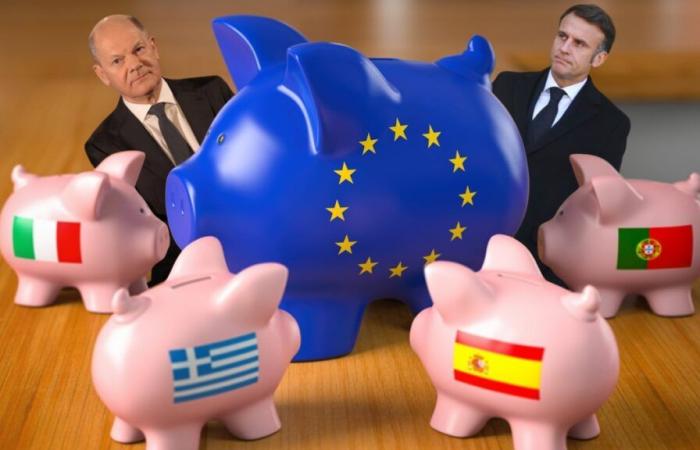Analyse
Image: WATSON
For decades, Germany and France were considered the economic engines of the European Union. But today, these two giants seem to be running out of steam. The situation is very different for the countries of southern Europe.
Frederick Holewik
An article from
The European economic balance is wavering: the two economic heavyweights, France and Germany, are facing weakened governments. Quarrels over budgets and the management of public debt have been major factors of discord.
Meanwhile, the former “enfant terribles” of the financial crisis – Portugal, Italy, Greece and Spain – have shown significantly more dynamic economic growth for several years. Forecasts for 2025 confirm this trend.
Thus, the European Commission plans an increase in the gross domestic product of Germany and France of 0.8% by autumn 2025. A similar increase is expected for Italy. On the other hand, the Commission forecasts growth of 1.9% for Portugal, and 2.3% for Spain and Greece.
Palpable economic gloom
The difficult economic situation in Germany is no longer limited to complaints from entrepreneurs. Large companies like Volkswagen and Thyssenkrupp have recently announced that they will reduce their workforce and close sites. The Ifo business climate index, which surveys thousands of entrepreneurs each month, fell for the sixth consecutive time. Business morale is at its lowest since the start of the pandemic in 2020. Economic research institutes continue to revise their forecasts downwards.
The ruling coalition, nicknamed the “traffic light coalition”, has not resisted the differences of opinion on the scale of the crisis and on the measures necessary to deal with it, in particular the idea of a new debt for support the economy.
In France, the government of Michel Barnier has also succumbed to the debates on the management of public debt. The Prime Minister wanted to reduce the public deficit from 6.1% to 5.0%. European budgetary rules normally set a ceiling of 3%. The public deficit refers to the gap between public expenditure and state revenue.. Reducing this deficit would leave less room to take on new debt. But the proposal was strongly criticized, both on the left and the right, which led to a vote of no confidence.
In December, this instability even led to an unexpected situation: France and Germany temporarily had to pay higher interest rates on their debt than Greece. And maybe this is just the beginning. The Moody’s agency recently lowered France’s credit rating from Aa2 to Aa3, citing a likely deterioration in public finances in 2024. A downgrade which makes borrowing more expensive.
A South that inspires confidence
This situation illustrates a reversal of economic dynamics in Europe. Former “bad students” from the south now inspire more confidence in banks and investorsand look to the future with more optimism. The reasons for this turnaround are multiple. Germany and France, long accustomed to coming out unscathed, were caught off guard. They had overcome the financial crisis of 2008 and, initially, seemed to resist the effects of the pandemic.
Southern European countries, heavily dependent on tourism, suffered particularly acutely at this time and took much longer to recover. Italy, for example, remained behind the European growth average for more than a decade. The austerity programs imposed by creditors – and by the EU – on Greece, as well as the violent protests that followed, are still remembered.
It is therefore mainly thanks to the revival of the tourism sector that these countries have regained their economic dynamism. Spain and Greece are now among the few regions in the world to have reached pre-pandemic levels.
Reforms are bearing fruit
Structural reforms have also contributed to their economic growth. A study by the German Institute for Economic Affairs (IW) in 2022 found that Greece’s participation in the European Stability Mechanism (ESM) program has borne fruit. Among the notable reforms:
- More efficient administration.
- A modernization of bankruptcy law.
- A reinforced fight against undeclared work.
- More rigorous tax collection.
Created after the financial crisis, the ESM’s mission is to support Member States in difficulty with loans and guarantees to preserve their solvency.
In addition, Southern Europe has benefited greatly from the €800 billion NextGenerationEU recovery fund. Carsten Brzeski, chief eurozone economist at major Dutch bank ING, told the newspaper Welt:
“Southern European countries have taken the recovery program much more seriously than richer countries”
They implemented the ambitious reforms requested by Brussels in exchange for these funds. Carsten adds:
“They had a clear vision of how they wanted to support structural reforms with this money”
Another important factor that worked in favor of the countries of the South and against Germany is energy. The latter had to do without its main oil and gas supplier, Russia.after the invasion of Ukraine. This process has been costly and a source of great uncertainty. Germany had to buy at much higher prices, and concerns arose about the ability to cover energy needs due to excessively high costs or supply shortages. Discussions were particularly heated on the issue of prioritization of energy supply in companies, which created problems in the industry.
In Southern Europe, the industrial sector plays a much less important role. The share of Russian energies in their energy mix is lower. In the long term, Greece, Spain, Portugal and Italy could even benefit from lower energy pricesthanks to the abundance of sun and wind in their coastal regions, which gives them an advantage in the energy transition.
How big will the crisis be?
What does this development mean for Europe? However, the president of the Kiel Institute for the World Economy (IfW), Moritz Schularick, emphasizes: “A new euro crisis is not imminent”. The crisis, however, highlights the political instability that Europe must face.
“Uncertainty over central fiscal and trade policy issues weighs on the European economy”
Moritz Schularick
Ulrich Kater, chief economist at DekaBank, assesses the situation similarly. “Market players frown on France, but do not turn away from it.he declares. This relative confidence can be explained by a situation very different from that of the 2008 financial crisis.
The Organization for Economic Cooperation and Development (OECD) forecasts growth of 1.1% for France this year, compared to stagnation for Germany. Furthermore, the interest rates that France must pay on its loans remain much lower than those that Greece had to bear at the worst of the euro zone crisis. At that time, high rates had fueled the debt spiral and plunged Greece into a deep economic crisis.
Contrasting perspectives
Despite their progress, southern European countries remain far from rivaling the overall economic performance of Germany and France. In 2022, Germany’s GDP amounted to 4,450 billion euros, compared to 3,030 billion for France. For comparison, the GDP of Italy, the largest economy in the south, reached 2,250 billion.
(Translated from German by Tim Boekholt)
News on the economy? This way
Show all articles







